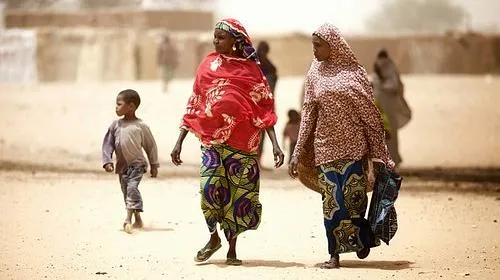Victims of War Urgently Need Protection and Humanitarian Assistance
DIFFA, Niger- June 24, 2016 – Two of the largest attacks in the history of the current conflict in Niger killed unknown numbers of civilians and displaced over 40,000 people on May 19 and June 3. Three weeks later, families continue to live in the open, under trees, without adequate access to basic life-saving assistance. The rains have started and children are at particular risk of illness and disease.
Save the Children estimates that 60 percent of the displaced are children. Families are still not safe and those who had already fled previous violence faced a repeat attack on June 16. There are now 280,000 people living in displacement in Niger contributing to the 2.7 million people displaced across the Lake Chad Basin region.
Commitments recently made by world leaders at the World Humanitarian Summit in Istanbul and the second Regional Security Summit in Abuja for improved humanitarian assistance and protection of civilians urgently need to be turned into real-time actions in Niger. The world is currently focused on a military solution to the insurgency, while the humanitarian and protection needs of nine million people across the Lake Chad Basin region are being consistently forgotten.
Twelve international nongovernmental organizations (INGOs) working in Niger are calling on United Nations Member States to increase diplomatic efforts and financial aid to support the humanitarian response in Niger.
The humanitarian situation in Diffa is rapidly deteriorating and the current response is inadequate. Support needs to be given to the Government of Niger and humanitarian actors for improved capacity to prevent, prepare and respond to the growing humanitarian crisis. This includes improved coordination, community participation, and emergency stockpiling, as well as, better access to information on needs, specific measures in place for children and women and quick emergency financing. Additionally, actions taken to safeguard civilians must include measures by the Government of Niger to build the confidence and trust of the local population. While the scale, urgency and complexity increases, funds are running dry.
“It is not weapons that create the greatest mortality during war; it is the secondary impacts of conflict that are the most devastating for civilians. Disease, hunger and the exhaustion of coping mechanisms can cause up to 90 percent of conflict-related mortality. Diffa was already prone to food insecurity, malnutrition, and maternal-child health risks, it is all the more crucial that the humanitarian response is rapid, to reduce preventable death” said Mohammed Chikhaoui, Oxfam Country Director in Niger.
The undersigned INGOs urgently appeal to international donors to mobilize funding that is rapidly available, flexible and meets the survival and protection needs of hundreds of thousands of people caught-up in conflict in the Diffa region of Niger as well as Chad, Cameroon and Nigeria.
Before this new emergency, the humanitarian needs in Diffa were only 28 percent funded. Now the needs are even greater. This crisis is severely overlooked with only 16 percent of required funds received for the overall Lake Chad Basin response.
“Humanitarian support in Diffa is crucial – not only because it is life-saving, but also because it will help keep those in dire straits, especially youth, away from insurgent groups, which in a place where there is hardly any schooling, food, or jobs, can often be seen as the only option,” said Matias Meier, Niger country director at the International Rescue Committee.
Addressing the causes and consequences of this conflict requires innovative joint actions in collaboration with the affected governments and local civil society to address inequality, social and political marginalization and poverty.
-ENDS-
Signatories: CARE, Oxfam, Save the Children, Help, ACF, IRC, CISP, COOPI, Concern Worldwide, Acted, Mercy Corps, Plan
Media contact: Holly Frew hfrew@care.org +1.404.979.9389
About CARE: Founded in 1945, CARE is a leading humanitarian organization fighting global poverty. CARE has more than six decades of experience helping people prepare for disasters, providing lifesaving assistance when a crisis hits, and helping communities recover after the emergency has passed. CARE places special focus on women and children, who are often disproportionately affected by disasters. To learn more, visit www.care.org.

